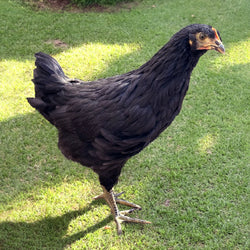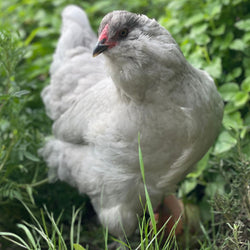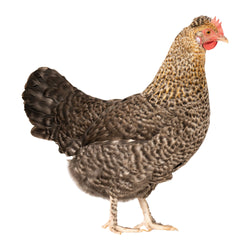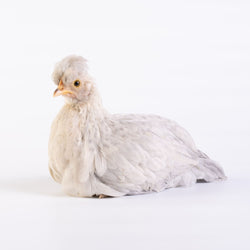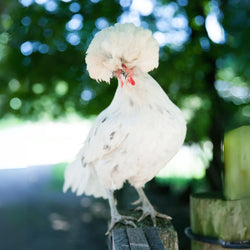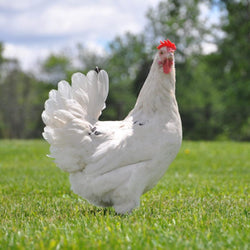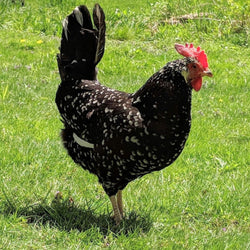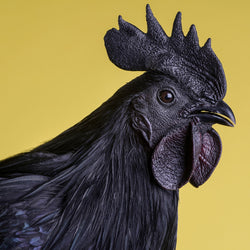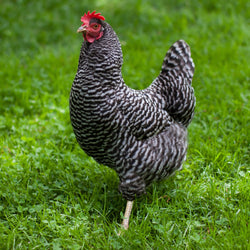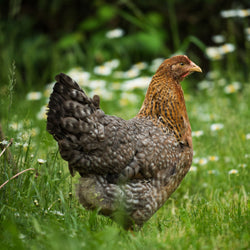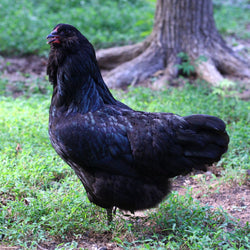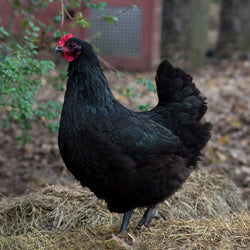page=2/--
Frequently Asked Questions
Here we answer the most commonly-asked questions about ordering, chicken care, and more.
What is molting?
Molting occurs once a year in adult birds older than one year, normally in late summer or autumn. During this time, birds will lose their feathers and regrow new ones. It's a way of refreshing their plumage for the winter so they'll stay warm. There are three types of molts: A hard molt. A hard molt means all the feathers are lost almost at once, so molting is over relatively quickly. A soft molt. A soft molt means the feathers are lost and regrown gradually. Sometimes you may hardly notice a soft molt, except as a reduction in laying. A...
Read MoreOne of our chickens is not laying in the nest box. Is this common, and what should I do?
Don't worry, it's common for hens to not lay in the nest box! "Floor eggs" are nothing to be too concerned about. Having your hens laying eggs on the floor rather than in the nest can be a pain in the neck. You want to be able to easily find all the eggs laid so you can gather them freshly--and you don't want to accidentally step on a floor egg! Some hens even lay eggs under the roosting area, which is just gross, because then the eggs get pooped on in the night. Having your eggs in a dark nest...
Read MoreWhy aren't my young chickens interested in their nest box, yet?
Your chickens will probably not be interested in the nesting boxes until it is time to lay. Even then, it may take them a while before they understand what nest boxes are.Some breeds are good about finding nesting boxes very quickly. For instance, Rhode Island Reds and Speckled Sussex are always very good about laying in their nest boxes from the start. By contrast, we find Easter Eggers took longer. And Silkies often refused nest boxes, instead laying eggs in the bedding in a dark corner of the coop. Keep in mind that your Orpingtons may not begin laying eggs...
Read MoreWhen will my chickens begin laying again in the spring?
Some chicken breeds lay year round (save when they go broody). One of our employees who's at a mid-latitude in the US reports that any girls who stop laying during the winter begin again regularly--and surprisingly precisely--on February 1 or 2, about halfway between the winter solstice and the spring equinox. If you live in an area where day length doesn't change much, your chickens may begin laying sooner (or never stop). If you live in an area where winter days are very short and cold, they may begin laying again later in the year. While it's the increasing light...
Read MoreWhy do my hens stop or almost stop laying in the late fall and winter months?
A chicken's reproductive cycle begins with her eyes, or possibly in her skull or even her skin, as one NC State extension article stated: The major environmental cue for control of reproduction is day length. Reception of light for reproductive purposes by the pullet is not primarily through the eyes but rather by the light energy penetrating the skull, skin and feathers and then perceived by an organ within the brain. My brain, you say? Light cues tell your chicken's body whether to release a yolk from her ovaries that will be turned into an egg. Even if the winter...
Read MoreWhat is a lash egg?
A lash egg is less of an egg than it is a roughly egg- or sausage-shaped exudate, consisting of thickened pus and other materials. It is probably the grossest egg your hen will ever lay, and will often look like cheesy, bloody strata or other matter arranged in strappy, skin-like layers. You may think she's expelled an internal organ. Ew. Seriously. If your hen lays a lash egg, it means she is sick with salpingitis, which is an infection of the oviduct. Please take her to a veterinarian immediately.
Read MoreAll about Salpingitis disease
If your hen lays a lash egg (something you won't soon forget--they're pretty gross!), you can be pretty sure that she has Salpingitis, meaning her oviduct is infected. This is really bad news for your hen and may be fatal, and she could continue to be a carrier even if she recovers! Read more to find out more about this disease: Salpingitis Also called Inflammation of the oviduct, infection of the oviduct Prevalence Common Signs General signs: No or mild signs in adult birds, including lethargy, loss of appetite, drop in laying, yellow poo, wheezing, coughing, sneezing, discharge from nares...
Read MoreWhy your chickens are not laying eggs (overview)
There are a number of possible reasons your chickens are not laying eggs. Let's look at a brief overview of reasons to give you some ideas, and you can click on each possibility for more details and a more in-depth discussion. Reasons your chickens are not laying Your hens may not be laying because they are too young. Your hens may not be laying because they are very old. Your hens may not be laying because it's wintertime. Your hens may not be laying because they're molting feathers. Your hens may not be laying because they're broody. Your hens may...
Read More- 1
- 2








"The Clubhouse" Coop
Easy to assemble and built to last, the Clubhouse Coop is the perfect starter coop for a small flock.
